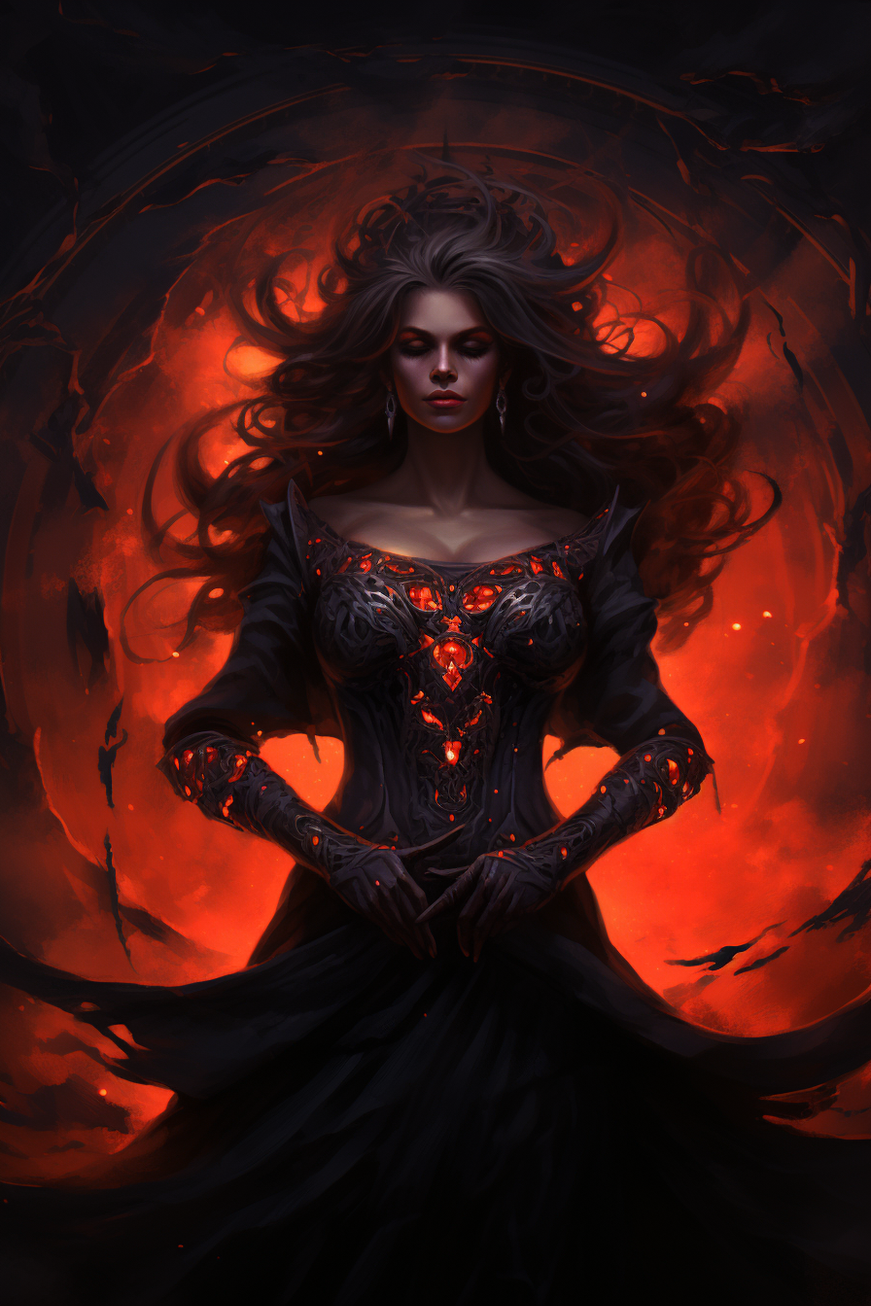Eventyr, a realm brimming with mystical allure and diverse cultures, offers a rich tapestry of faiths for players to explore in their Dungeons & Dragons campaigns. For those yearning to delve into a religious-focused character, understanding the major religions in Eventyr is crucial. This blog post delves into the various faiths, their deities, and how they can shape your character's journey.
While some deities in Eventyr are taken directly from core D&D 5E gods or goddesses, many are adapted to our homebrew world of Eventyr and may be slightly (or substantially) different than core D&D.

Bahamut (LG) / Helm (LG): The Just Protectors
Bahamut and Helm represent justice, righteousness, and fairness. While Bahamut takes a dragon form, Helm is a vigilant guardian often worshipped by Dwarves.
Colors and Symbols
Colors: Gold and Silver
Symbols: A dragon (Bahamut) and a vigilant eye (Helm)
Character Play
Characters devoted to these deities might uphold strict moral codes, protect the innocent, and fight against injustice. Paladins and clerics are ideal classes for followers.

Sylvanus (NG): The Nature's Guardian
Sylvanus embodies nature, rebirth, and growth, fostering harmony with the natural world.
Colors and Symbols
Colors: Green and Brown
Symbols: A tree leaf and a blooming flower
Character Play
Druids, rangers, or nature-aligned clerics would fit well with Sylvanus. Characters could focus on protecting nature and promoting natural balance.

Arebus (CE): The Dark Enigma
Arebus is the goddess of darkness, shadows, and malevolence, often associated with sinister and mysterious aspects.
Colors and Symbols
Colors: Black and Dark Red
Symbols: An eclipsed sun and a shadowy figure
Character Play
Rogues, warlocks, or shadow sorcerers could worship Arebus. Your character might engage in espionage, use shadow magic, or pursue power through dark means.

Aostre (NG): The Dawnbringer
Aostre is the goddess of dawn, daylight, renewal, and rebirth, signifying new beginnings and hope.
Colors and Symbols
Colors: Light Blue and Yellow
Symbols: A rising sun and a phoenix
Character Play
Clerics or bards who focus on healing, rejuvenation, or inspirational leadership would embody Aostre's ethos.

Ablis (NE): The Despair's Herald
The god Ablis embodies despair, misery, and greed, often associated with hopelessness and selfish pursuits.
Colors and Symbols
Colors: Gray and Dark Green
Symbols: A broken coin and a teardrop
Character Play
Characters might be driven by personal gain, could be cynics, or act as agents of despair. Suitable for morally grey or conflicted characters.

Selune (CG): The Moonlit Hope
Selune is the goddess of moonlight, hope, purity, and equality, associated with guidance and protection.
Colors and Symbols
Colors: White and Pale Blue
Symbols: Crescent moon and stars
Character Play
Wanderers, healers, and those who seek to protect and guide others are ideal followers. Moon-based magic users fit well.

Asmodeus (LE): The Master Manipulator
The Lord of Hell, Asmodeus is known for manipulation, exploitation, greed, and judgment, embodying ambition and cunning.
Colors and Symbols
Colors: Red and Black
Symbols: A throne and a snake
Character Play
Warlocks, ambitious fighters, or cunning bards seeking power and influence would align with Asmodeus.

Rillifane Rallathil (CN): The Wind's Whisperer
Exclusive to elves, Rillifane symbolizes nature, wind, and preservation of the natural world.
Colors and Symbols
Colors: Emerald and Gold
Symbols: Gust of wind and an oak leaf
Character Play
Elven druids, rangers, or nature-themed characters fit this deity. Focus on protecting forests and natural sanctuaries.

Akira (LN): The Order's Beacon
The goddess Akira embodies leadership, authority, and a strict adherence to law and orderliness.
Colors and Symbols
Colors: Navy Blue and White
Symbols: A gavel and a set of scales
Character Play
Lawful characters like paladins, monks, or judges who adhere strictly to codes and laws would be devout followers.

Alidammara (N): The Merry Trickster
Alidammara is the god of rogues, bards, and those who cherish life’s pleasures like wine, revelry, music, humor, and tricks.
Colors and Symbols
Colors: Burgundy, gold, and silver
Symbols: A wine goblet and a lute
Character Play
Rogues, bards, and characters who enjoy life’s pleasures, often employing humor and cunning in their adventures.
Crafting Your Faithful Character
In the rich tapestry of Eventyr's pantheon, players have a vast array of deities to choose from, extending far beyond the basic pantheon. This expanded set offers gods and goddesses that align with both good and evil, providing a diverse range of choices for character creation. For instance, Kelenvor (LN), the god of the Dead, might appeal to characters who respect the balance of life and death, while Ilmater (LG), the god of Endurance, could be a source of inspiration for those who persevere against all odds.
For those inclined towards darker paths, Beshaba (CE), the goddess of Misfortune, offers a unique patronage to characters who revel in chaos and unpredictability. On the other hand, Chauntea (NG), the goddess of Agriculture, embodies nurturing and growth, ideal for characters with a connection to nature and the land.
Warlocks might find their calling with various cults like The Archfey, The Celestial, or The Fiend, each offering distinct powers and role-playing opportunities. The Hexblade and The Great Old One, for instance, provide intriguing backstories and abilities for those seeking a more mysterious or arcane connection.
Evil Sects like Bhaal, the god of Murder, cater to characters who embrace malevolent pursuits. Each deity in these sects, from the devious Cyric, god of Lies, to Malar, the god of the Hunt, provides a unique framework for characters driven by darker motives.
When crafting a character, players should consider how their chosen deity’s domain and ethos align with their character's motivations, background, and class. Whether seeking the joyous freedom of Lillira (CG), the goddess of Joy, or the strict discipline of Loviatar (LE), the goddess of Pain, the choice of deity can deeply influence a character's journey, shaping their abilities, goals, and moral compass.



















